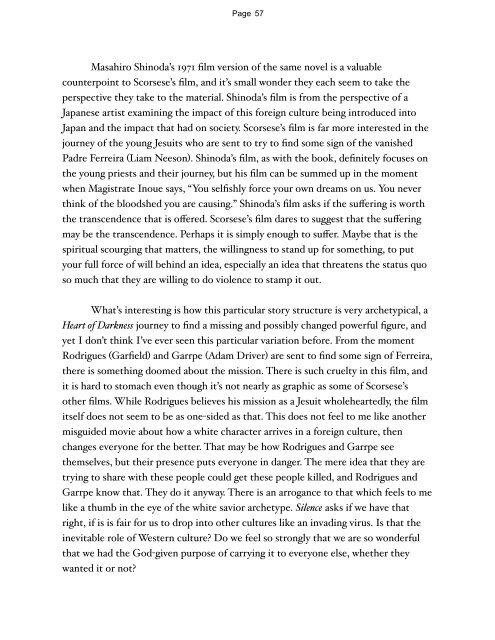Create successful ePaper yourself
Turn your PDF publications into a flip-book with our unique Google optimized e-Paper software.
Page 57<br />
Masahiro Shinoda’s 1971 film version of the same novel is a valuable<br />
counterpoint to Scorsese’s film, and it’s small wonder they each seem to take the<br />
perspective they take to the material. Shinoda’s film is from the perspective of a<br />
Japanese artist examining the impact of this foreign culture being introduced into<br />
Japan and the impact that had on society. Scorsese’s film is far more interested in the<br />
journey of the young Jesuits who are sent to try to find some sign of the vanished<br />
Padre Ferreira (Liam Neeson). Shinoda’s film, as with the book, definitely focuses on<br />
the young priests and their journey, but his film can be summed up in the moment<br />
when Magistrate Inoue says, “You selfishly force your own dreams on us. You never<br />
think of the bloodshed you are causing.” Shinoda’s film asks if the suffering is worth<br />
the transcendence that is offered. Scorsese’s film dares to suggest that the suffering<br />
may be the transcendence. Perhaps it is simply enough to suffer. Maybe that is the<br />
spiritual scourging that matters, the willingness to stand up for something, to put<br />
your full force of will behind an idea, especially an idea that threatens the status quo<br />
so much that they are willing to do violence to stamp it out.<br />
What’s interesting is how this particular story structure is very archetypical, a<br />
Heart of Darkness journey to find a missing and possibly changed powerful figure, and<br />
yet I don’t think I’ve ever seen this particular variation before. From the moment<br />
Rodrigues (Garfield) and Garrpe (Adam Driver) are sent to find some sign of Ferreira,<br />
there is something doomed about the mission. There is such cruelty in this film, and<br />
it is hard to stomach even though it’s not nearly as graphic as some of Scorsese’s<br />
other films. While Rodrigues believes his mission as a Jesuit wholeheartedly, the film<br />
itself does not seem to be as one-sided as that. This does not feel to me like another<br />
misguided movie about how a white character arrives in a foreign culture, then<br />
changes everyone for the better. That may be how Rodrigues and Garrpe see<br />
themselves, but their presence puts everyone in danger. The mere idea that they are<br />
trying to share with these people could get these people killed, and Rodrigues and<br />
Garrpe know that. They do it anyway. There is an arrogance to that which feels to me<br />
like a thumb in the eye of the white savior archetype. Silence asks if we have that<br />
right, if is is fair for us to drop into other cultures like an invading virus. Is that the<br />
inevitable role of Western culture? Do we feel so strongly that we are so wonderful<br />
that we had the God-given purpose of carrying it to everyone else, whether they<br />
wanted it or not?


